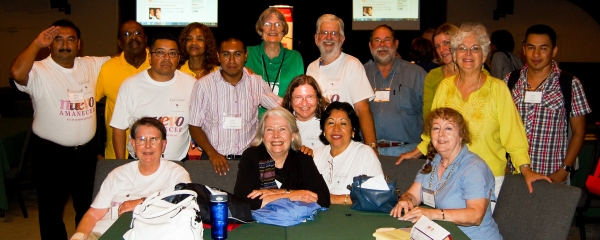Deacon Reflection: ¿Habla usted Español?

By the Rev. Katherine Johnson
As an English speaker who began learning Spanish while in my 40s, I am definitely not fluent, and I can't easily converse with native speakers. Indeed, when I open my mouth to say something in a language other than English, French is more likely to emerge. Nevertheless, I realized about 25 years ago that we U.S. Anglophones (a French term) needed to learn to communicate in Spanish. So I started practicing with cassette tapes, then took some lessons. By the time the Durham Convocation founded Iglesia el Buen Pastor in the former St. Andrew's church in Durham, I could greet people in Spanish and understand what someone was saying (if they spoke slowly enough!).
After the Rev. Nicolás Menjívar became the first vicar of Iglesia el Buen Pastor, I felt called to assist the new congregation directly, rather than just cheering from the sidelines. For several years, St. Matthew's, Hillsborough, the congregation where I'm assigned as a deacon, shared me with Iglesia el Buen Pastor, and I served as deacon there one Sunday a month in addition to participating in other activities. At one clergy conference almost 20 years ago, Padre Nicolás and I decided to invite any clergy person interested in Hispanic ministry to gather during our free afternoon. Quite a few showed up, and several agreed to meet again. Eventually, this small group gained official status, and its descendant is the Chartered Committee on Hispanic Ministry.
As an early member of the Committee on Hispanic Ministry, I attended the first-ever Episcopal Church conference on Hispanic / Latino ministries in 2004, held at Kanuga and sponsored by the Diocese of Western North Carolina. Our group was so small we all fit into one conference room. This August, 14 years later, I attended Nuevo Amanecer, the now-biennial Latinx ministries event that gathers Episcopalians from around the world at Kanuga. This time, we fit into one room -- but the room was the gym, not a conference room! All of the addresses and workshops featured the conference themes: build, equip, inspire -- construimos, equipamos, inspiramos.
The Rt. Rev. José McLoughlin, Bishop of the Diocese of Western North Carolina, welcomed about 380 people to Kanuga, observing that he was the first bishop named José to serve The Episcopal Church in our state. He celebrated his diocese's ministries to and by Latino people.
The speakers in three plenary sessions were The Rt. Rev. Daniel G. P. Gutiérrez, Bishop of the Diocese of Pennsylvania; The Rt. Rev. Rafael Morales, Bishop of the Diocese of Puerto Rico; and The Rev. Stephanie Spellers, Canon to the Presiding Bishop for Evangelism, Reconciliation and Stewardship of Creation. All of them offered thought-provoking visions for the ministries of the Episcopal Church, but here I want to note Bishop Gutiérrez's observations.
He began by reflecting on Alice Walker's story "The Welcome Table," in which a poorly dressed black woman is turned away from a Sunday service in a white church -- and then something unusual happens. Building on the point of Walker's story, the bishop reminded us that we need to break down assumptions, that Jesus founded a community with a different vision than the prevailing one of His time, and that we should put discipleship before membership. Sounding as much like a deacon as a bishop, he recommended that we ask, at every event or meeting, "who is not here?" He wondered why it's so hard for us to look a homeless person in the eye. And he urged us not to fail the helpless members of society. My conclusion from what I heard him say is that the Episcopal Church should work harder to include everyone, and that we have it within us to succeed in this calling. He also reminded us that when we give love, nothing is taken away from us.
These themes recurred in many ways throughout our gathering: in the workshops and the other plenary addresses; in our worship; and in our interactions with one another. What a joyful gathering this was, filling each of us to overflowing with God's love and inspiring us to shout "Alleluia!" to the heavens as we sang and danced our Creator's praise.
A small digression here: at dinner one evening, I discovered that several of my Latino table-mates came from San Mateo, Hyattsville, in the Diocese of Washington. With an astonished look on my face, I told them that I had served at St. Matthew's, Hyattsville, when I was in seminary in the 1980s. San Mateo is now the strongest Latino congregation in that diocese. We formed an instant bond across decades, cultures, and languages, just from my casual question about where my table-mates went to church. ¡Demos gracias a Dios!
Reflecting on these events, I realize that a deacon's work is the very definition of evangelism. In the examination of the candidate for ordination, the bishop asks if we will "look for Christ in all others, being ready to help and serve those in need?" Indeed, at Kanuga, in that modest (but air-conditioned) gym building, I found Christ in those around me, and I saw that those around me were also looking for -- and finding -- Christ in me, in everyone there, and in those we meet in our daily lives.
At Nuevo Amanecer, I experienced a vibrant and refreshing Episcopalian community: truly the Episcopal branch of the Jesus Movement. May our "loving, life-giving, and liberating God" give each of us the courage to welcome the stranger as we "look for Christ in all others."
Tags: Deacon Reflections
